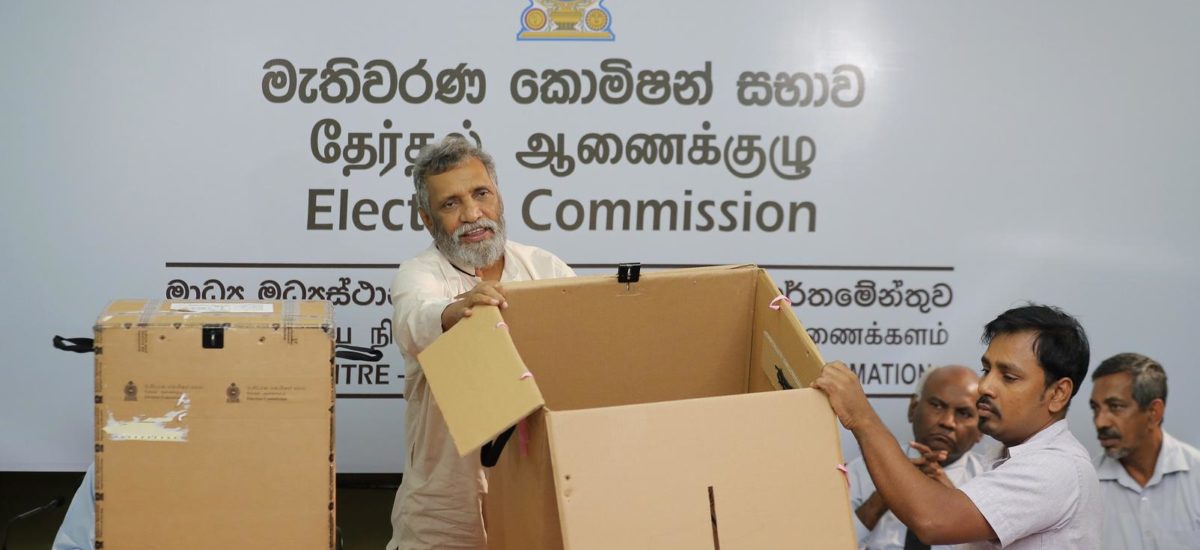Photo courtesy of Human Rights Watch
Universal franchise is the right of all qualified citizens irrespective of their race, religion, language, ethnicity, caste, education, ownership of wealth, birth, the place of birth, gender or any other difference to participate in the administration of the country and to elect their representatives. Universal franchise confers sovereignty in the people; the right of taking decisions about himself or herself and about the county is vested with the citizen. The foundation of the republics based on democratic principles after changing monarchisms was the universal franchise. The bridge for the people to join with public administration is the universal franchise.
All citizens of Sri Lanka who have completed 21 years of age were granted universal franchise in 1931 unless they were subject to any special disqualification. The age of right to cast vote was lowered from 21 years to 18 by the Elections Amendment Act No, 11 of 1959. Universal franchise has been a right constitutionally substantiated by the Republic Constitution of 1972 and the Constitution of 1978. Article 3 of the constitution of 1978 states that sovereignty is in the people and is inalienable.
Sovereignty includes the powers of government, fundamental rights and franchise are include in the sovereignty. Franchise is part and parcel of sovereignty. The legislative power of the people is exercised by Parliament, consisting of elected representatives of the people and by the people. The executive power of the people, including the defence of the country, is exercised by the President of the Republic elected by the people, while the judicial power of the people is exercised by Parliament through courts of law. The total system of administration, enactment of laws, the executive and justice are exercised by people through franchise.
The granting of universal franchise in 1931 was an unparalleled achievement at a time when land ownership, social status and wealth were the main requirements for being able to vote. But it is a great tragedy that Sri Lanka’s universal franchise has become weak and diluted after two or three generations.
Officials who conducted the elections before the establishment of the Department of Elections were Edwin Ronald Sudbury, P.O. Fernando, G.G. Thambiah and Victor Lloyd Weerasinghe.
The Department of Elections was formed on October 1, 1955 amalgamating the Department of Parliamentary Elections and Department of Local Authorities Elections. It was headed by the Commissioner of Elections. The Election Commission, established on November 13, 2015, is the body that today is in the forefront of conducting and managing elections.
There have been 74 elections held in the country; most have been free and fair, with some exceptions. From Edwin Ronald Sudbury, the first parliamentary election official, to the three members of the Election Commission, election authorities have made strenuous efforts to preserve the integrity of the election process.
While the Election Commission has many roles to play, the most important action it took was to draft a bill to regulate election campaign expenditure. If election campaign expenditure is not regulated, young people who have leadership qualities but lack funds will not be able to contribute to governance.
The challenges before the new Election Commission are great. Under the 20th Amendment, its powers have been severely curtailed. Its new chairman, Nimal Punchihewa, is an expert in law and human rights as well as a person who knows the workings of the Election Commission thoroughly. However, administrative and financial responsibilities must be handed over to the Election Commission to make policy decisions.
There are five main processes that need to be addressed:
- Creating a mechanism for regulating election campaign expenditure: Talented but financially deprived youth will have to leave the political arena if campaign expenditure is not regulated. According to the Centre for Monitoring Election Violence, the estimated campaign cost of the last Parliamentary election was close to 4,000 million. Only 25 to 30 per cent of the estimated campaign cost could be monitored.
- Immediate update of electoral laws that should be amended: Of the 35 candidates in the last presidential election, some signed the nominations to contest for the purpose of extorting money from the two major political parties.
- Facilitating the voting of those who have reached the age of 18 through the proposed 18 Plus Bill: Although 18 years of age is the constitutional right to vote, some young people have to wait for two or three more years for their first vote. (The Bill prepared by the last Commission can be used for this purpose).
- Adoption of an election calendar for holding elections on a specific day: Elections can disappear if there is no timetable. The Provincial Councils election is a good example of this.
- Providing electoral facilities to three million voters: There are 2.6 million Sri Lankans abroad without voter facilities as well as government essential service workers, the fishing community, garment sector and investment zone workers, people with disabilities and LGBT community groups who are denied their voting rights for various reasons.

